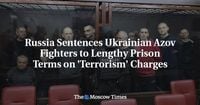On March 26, 2025, a Russian military court sentenced 12 members of Ukraine's Azov Battalion to prison terms ranging from 13 to 23 years on terrorism charges, marking one of the largest and most high-profile trials of Ukrainian prisoners of war since the onset of the full-scale invasion. This ruling has drawn international attention and criticism, as it underscores the ongoing tensions and the complex narrative surrounding the conflict between Russia and Ukraine.
The sentences were handed down in Rostov-on-Don, where the court found the defendants guilty of various charges, including organizing or participating in a terrorist organization and attempting to seize power. The group consisted of military personnel and support staff, including cooks and maintenance workers, who were captured during the fierce battles in Mariupol in the spring of 2022.
According to reports from independent news outlet Mediazona, the court proceedings were fraught with allegations of mistreatment and torture. The defendants claimed they had been subjected to severe physical abuse, including beatings that resulted in broken bones, and were forced to endure degrading treatment while in custody. They reported being interrogated with bags over their heads and denied basic necessities such as hygiene products, with one detainee's body left in an overcrowded cell for days.
Initially, 24 Ukrainians were part of this trial, but 11 of them, including nine women, had been released in previous prisoner exchanges. The sentences issued on March 26 included those of 11 individuals who were tried in absentia after being returned to Ukraine. One notable case is that of Oleksandr Ishchenko, a soldier who died in Russian custody in 2024. While Russian authorities attributed his death to heart issues, a Ukrainian examination revealed he had suffered multiple broken ribs and severe chest injuries.
The Azov Battalion, which was founded in 2014 and later integrated into Ukraine's National Guard, has been designated a "terrorist organization" by Russia since August 2022. This classification has been used by Moscow to justify its military actions and narrative of "denazification" against Ukraine. The battalion gained notoriety for its defense of Mariupol, particularly at the Azovstal steel plant, where it held out against Russian forces for an extended period during the early months of the war.
Despite Russia's claims of the Azov Battalion's extremist links, many in Ukraine view its fighters as heroes who embody the country's resistance against aggression. The Kremlin has asserted that nearly 2,500 Azov fighters surrendered at the Azovstal steelworks, and Russian authorities have reported that 145 members of the Azov Battalion have been convicted in various trials since the beginning of the conflict.
The recent court ruling has sparked outrage among human rights advocates and international observers who argue that the trials are politically motivated and lack due process. The defendants' claims of torture and the conditions of their detention have raised serious concerns about the treatment of prisoners of war in Russia.
In addition to the court proceedings, a significant prisoner exchange took place recently, where 197 defenders were returned to Ukraine, including 31 from Mariupol and 18 from Azovstal. This exchange highlighted the ongoing struggles faced by families of captured soldiers, many of whom have been subjected to extortion by fraudsters posing as intermediaries for prisoner negotiations.
As the conflict continues, the situation for Ukrainian prisoners of war remains precarious, with their fates often tied to the broader geopolitical dynamics between Russia and Ukraine. The international community watches closely, with calls for accountability and adherence to humanitarian standards in the treatment of all prisoners of war.
The sentencing of the Azov fighters serves as a stark reminder of the deep divisions and ongoing hostilities that characterize the Russia-Ukraine conflict. As both sides continue to navigate this complex landscape, the human cost of war remains painfully evident, with individuals caught in the crossfire of political and military ambitions.
Overall, the recent court ruling against the Azov fighters not only reflects the harsh realities of the ongoing conflict but also raises critical questions about justice, human rights, and the treatment of prisoners in wartime. The world watches as the situation unfolds, hoping for a resolution that respects the dignity and rights of all individuals involved.







